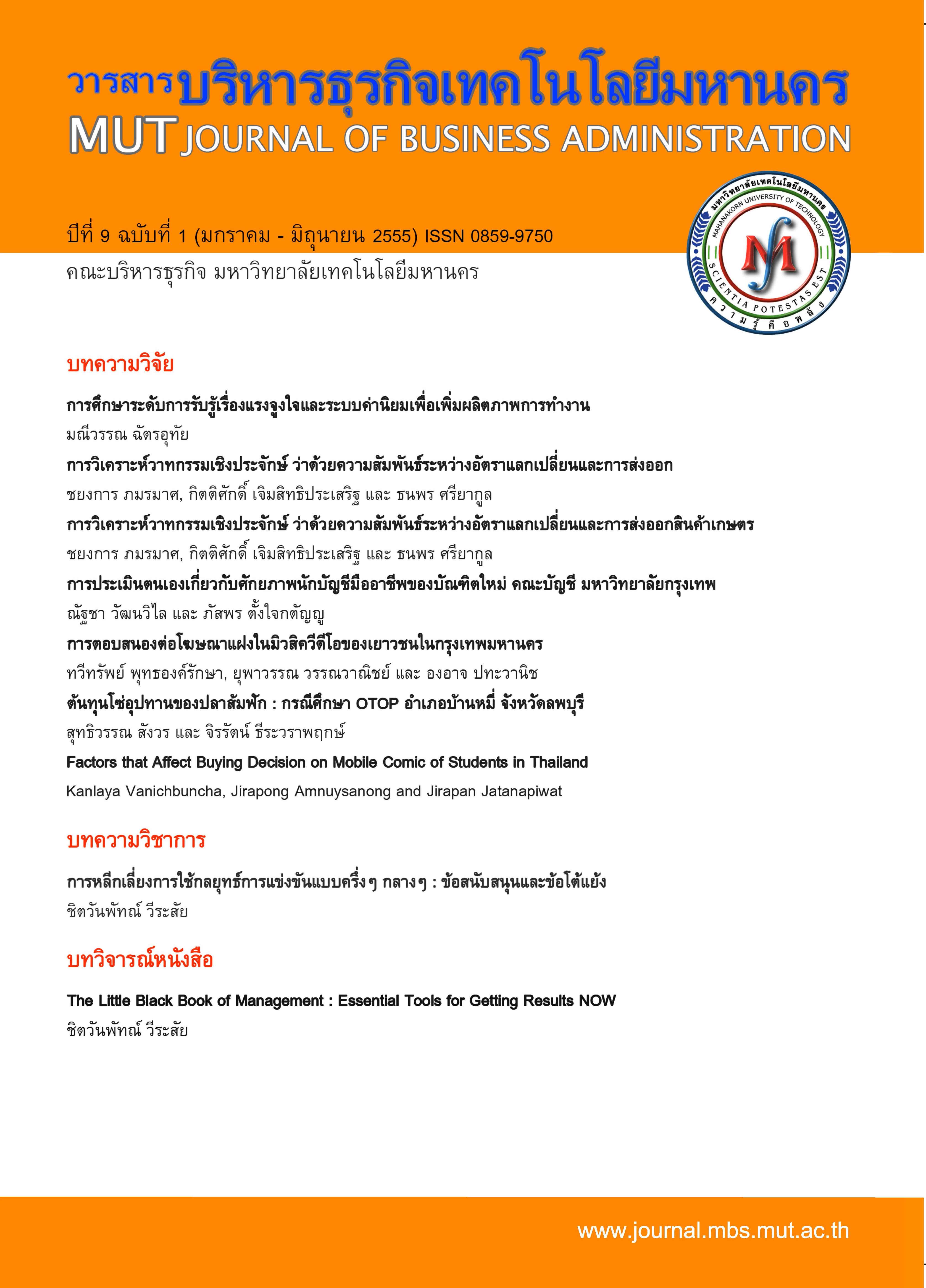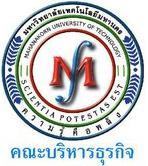การศึกษาระดับการรับรู้เรื่องแรงจูงใจและระบบค่านิยมเพื่อเพิ่มผลิตภาพการทำงาน
Keywords:
การรับรู้แรงจูงใจในการทำงาน, ค่านิยมในการทำงาน, Perceptions of Work Motivation, Work ValuesAbstract
งานศึกษาวิจัยนี้มุ่งให้ข้อมูลเชิงประจักษ์ที่เกี่ยวข้องกับแนวคิดเรื่องแรงจูงใจและค่านิยมในการทำงาน กลุ่มตัวอย่างที่ทำการศึกษาประกอบด้วยผู้เข้าร่วมกิจกรรมฝึกอบรมของสภาองค์การนายจ้างแห่งประเทศไทย (ECOT) จำนวน 236 คน ทั้งนี้ ตัวแปรอิสระที่ใช้ประกอบด้วย เพศ อายุ อายุงาน สถานภาพการสมรส และตำแหน่งงาน และตัวแปรตามได้แก่ แรงจูงใจ 3 ประการคือ แรงจูงใจใฝ่สัมฤทธิ์ อำนาจและสัมพันธภาพ และ ค่านิยมเชิงเครื่องมือหรือวิธีการ
ผลการศึกษาพบว่า ระดับแรงจูงใจใฝ่สัมฤทธิ์มีค่าเฉลี่ยสูงสุด รองลงมาได้แก่ แรงจูงใฝ่สัมพันธภาพและแรงจูงใจใฝ่อำนาจ และค่านิยมที่มีค่าเฉลี่ยสูงสุดคือความสุภาพอ่อนน้อมต่อผู้อาวุโส และมีความถ่อมตน ขณะที่ค่านิยมที่มีค่าเฉลี่ยต่ำสุดคือการเป็นผู้มีความคิดสร้างสรรค์และจินตนาการ และเมื่อทำการเปรียบเทียบค่าเฉลี่ยการรับรู้อย่างมีนัยสำคัญที่ระดับ 0.05 พบว่าเพศชายมีระดับแรงจูงใจใฝ่อำนาจสูงกว่าเพศหญิง ขณะที่กลุ่มอายุ 36 ปีขึ้นไปมีแรงจูงใจใฝ่สัมฤทธิ์สูงกว่ากลุ่มอายุ 35 ปีและต่ำกว่า ส่วนกลุ่มการศึกษาระดับปริญญาตรีขึ้นไปมีระดับแรงจูงใจใฝ่สัมฤทธิ์และแรงจูงใจใฝ่อำนาจสูงกว่ากลุ่มการศึกษาต่ำกว่าปริญญาตรี ขณะที่กลุ่มผู้บริหารมีแรงจูงใจใฝ่สัมฤทธิ์ แรงจูงใจใฝ่อำนาจและใฝ่สัมพันธภาพสูงกว่ากลุ่มผู้ปฏิบัติงาน และเมื่อวิเคราะห์การรับรู้เรื่องค่านิยม พบว่า เพศชายให้ความสำคัญกับค่านิยมการเป็นผู้มีความคิดสร้างสรรค์สูงกว่าเพศหญิง และผู้สำเร็จการศึกษาระดับปริญญาตรีขึ้นไป ให้ความสำคัญกับค่านิยมความซื่อสัตย์สุจริตและการรับฟังความคิดเห็นของ ผู้อื่น สูงกว่ากลุ่มการศึกษาระดับต่ำกว่าปริญญาตรีอย่างมีนัยสำคัญทางสถิติ และเมื่อทำการวิเคราะห์ค่าสหสัมพันธ์ระหว่างตัวแปรด้วยวิธีของ Pearson พบระดับความสัมพันธ์ในระดับต่ำและปานกลางระหว่างตัวแปร
Perception of Need-based Motivation and Work Values on the Enhancement of Productivity.
This research study aims at providing empirical data base on the key concepts of Need-based motivation and instrumental work values. Target samples were 236 employees attending the workshop organized by the Employers' Confederation of Thailand. Independent factors include gender, age, working years, marital status and management position. Dependent factors are the three motivations comprising achievement, power, and affiliation needs; having the perception of work values as mediate factor.
Key findings were that needs for achievement ranked first, followed by needs for affiliation and needs for power. On the scale of work value, the respondents placed high value on politeness and humble, while the lowest on the scale was creativity and imaginative. Further mean comparisons showed that at a significant level of 0.05, men had higher needs for power than women; while needs for achievement received higher mean scores among workers with 36 years and older and workers with bachelor degree and above. Marital status showed no statistically significant difference in the mean perception. However, managerial position workers had higher needs for achievement, power, and affiliation, than operational workers. In the perception of work value, it is found that workers with bachelor degree and above rated the values of honesty higher than the ones with senior highs and lower diploma. Lower correlations were found among dependent factors. Based on this study, future empirical survey research can be conducted to further probe into other variables and target settings.
Downloads
Issue
Section
License
ข้อความ ข้อคิดเห็น ข้อมูล เนื้อหา รูปภาพ แผนภูมิ แผนผัง เป็นต้น ที่ปรากฏและแสดงในบทความต่างๆ ในวารสารบริหารธุรกิจเทคโนโลยีมหานคร ถือเป็นความรับผิดชอบโดยตรงของผู้เขียนบทความนั้นๆ มิใช่เป็นความรับผิดชอบใดๆ ของวารสารบริหารธุรกิจเทคโนโลยีมหานคร และมหาวิทยาลัยเทคโนโลยีมหานคร
บทความที่ตีพิมพ์ในวารสารบริหารธุรกิจเทคโนโลยีมหานคร ถือเป็นลิขสิทธิ์เฉพาะของคณะบริหารธุรกิจ มหาวิทยาลัยเทคโนโลยีมหานคร หากบุคคลหรือหน่วยงานใดต้องการนำทั้งหมดหรือส่วนใดส่วนหนึ่งไปเผยแพร่ต่อหรือเพื่อกระทำการใดๆ จะต้องได้รับการอนุญาตเป็นลายลักษณ์อักษรจากคณะบริหารธุรกิจ มหาวิทยาลัยเทคโนโลยีมหานครก่อนเท่านั้น


